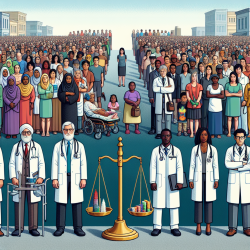Understanding the Intersection of Poverty, Racism, and Public Health
The research article "Poverty, Racism, and the Public Health Crisis in America" by Beech et al. highlights the profound impact of poverty and racism on public health. As practitioners, understanding these factors is crucial for improving health outcomes in marginalized communities. The article emphasizes that poverty is not merely a lack of income but a multifaceted issue involving economic well-being, societal navigation, and social exclusion due to institutional behaviors.
Key Findings and Implications for Practitioners
The research underscores that poverty and racism are deeply intertwined, contributing to health disparities among racial and ethnic minorities. Practitioners must recognize that these disparities are not due to inherent racial traits but are a result of structural racism and economic injustice. This understanding is vital for developing effective interventions and fostering trust with patients from marginalized backgrounds.
Data-Driven Strategies for Improved Outcomes
Evidence-based prevention and early intervention initiatives are critical in mitigating the adverse effects of socioeconomic deprivation. Practitioners can implement the following strategies:
- Utilize culturally concordant health education and social media to disseminate health information effectively.
- Leverage social support networks to enhance community resilience and support.
- Adopt primary intervention strategies such as mobile clinics and lay health workers to increase access to care.
These approaches are not only practical but also essential in addressing persistent racial and ethnic disparities in chronic diseases.
Encouraging Further Research and Action
While the current research provides a comprehensive understanding of the issues, further studies are necessary to explore innovative solutions and their implementation in diverse settings. Practitioners are encouraged to engage in ongoing education and research to stay informed about the latest developments and best practices in addressing health disparities.
Conclusion
Addressing the public health crisis caused by poverty and racism requires a multifaceted approach that includes evidence-based interventions, community engagement, and continuous research. Practitioners play a crucial role in this effort by applying data-driven strategies to improve health outcomes for marginalized populations. By doing so, we can move towards a more equitable healthcare system.
To read the original research paper, please follow this link: Poverty, Racism, and the Public Health Crisis in America.










